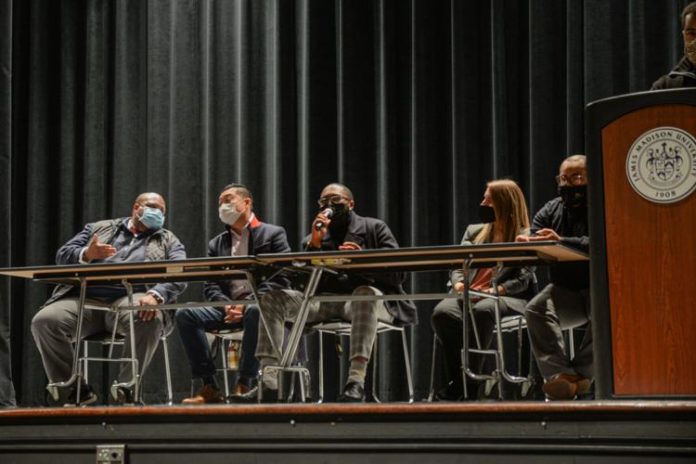
The Interfraternity Council (IFC) hosted a panel unpacking Diversity, Equity and Inclusion (DEI) in the Greek community at JMU on Nov. 16.
IFC Vice President of Social Justice and Inclusion Ellis Lar-Moore, a senior business management major and member of the Beta Theta Pi fraternity at JMU, organized and moderated the event.
After introductions, Lar-Moore looked for a show of hands — who knew the meaning of DEI? Very few hands went up.
“Diversity is defined as the presence of differences in a given setting,” Lar-Moore said. “Most people would think that diversity just refers to the physical traits, such as color of skin, gender or sexuality — the main things you think of. But, while those things are important, the majority of diversity is the things that we can’t see.”
Lar-Moore continued, defining both equity — promoting representation, impartiality and fairness of diverse individuals within organizations — and inclusion, which he described as ensuring those who are diverse feel welcome.
Lar-Moore shared personal experiences he’s had being a Black man in a JMU fraternity. He said in the beginning, it was difficult to cope with being in a majorly white fraternity because very few brothers looked like him, and he wasn’t sure if he could be the realest version of himself.
“Part of me was wondering, ‘Was I doing something wrong for not joining a Black frat?’” Lar-Moore said.
Along with his own experiences, Lar-Moore read testimonials from other members of JMU’s Greek population.
“As someone who came to JMU from a very diverse public high school, I found the student body here to be a bit of a culture shock,” Lar-Moore read from one of the testimonials. “I remember thinking ‘where are all the people of color?’ Greek life was even less diverse in itself.”
He then began a series of general questions directed to the panel, opening the night’s discussion of DEI at JMU.
Lar-Moore started the conversation by asking what the panel’s biggest piece of advice is for how JMU organizations can begin DEI work. Marlon Gibson, director of community engagement for Kappa Alpha Order, said chapters at JMU “don’t have to go far” for DEI work. He said he believes chapters need to have discussions within themselves first and determine their own priorities — like making sure members of the chapter feel welcome, heard and seen — before going into the community or discussing with other chapters.
“It’s hard to call someone ‘brother’ if you don’t even really know them or know their background or where they’ve come from,” Gibson said. “My piece [of advice] would just be how about we have some conversations at home first, determine those priorities, before we go outside of our actual house.”
Lar-Moore and Daerenz Lyons, the 2021-22 presidential engagement fellow for diversity, equity and inclusion at JMU, piggybacked on the conversation by saying DEI work needs to be “intentional” and not “just another checkbox.”
“Diversity for diversity’s sake is counterproductive,” Lar-Moore said.
The panelists agreed that many diversity changes and initiatives have been made on campus within the last year, including the renaming of buildings on the Quad.
Lyons, who first came to JMU in 2017, said he believes JMU has “come a long way” in the last couple years but that there’s still a lot of room to grow.
Brent Lewis, associate vice president for diversity, equity and inclusion at JMU, added he first came to JMU in 2020 shortly after the deaths of George Floyd and Breonna Taylor. He said he’s only known JMU “in crisis.”
“Campus was on fire, literally, when I got here,” Lewis said. “I have seen diversity initiatives put forward, but I also think that some of it was on the backs of what was happening in our country. So, we continue to move initiatives forward, and we continue to have needed conversations.”
Lar-Moore finished his part of the discussion by asking the panelists to define diversity in their own words using their unique perspectives. Karina Kline-Gabel, faculty diversity liaison for the College of Arts and Letters and a JMU Spanish professor, put it in simple terms.
“Diversity is all of us,” Kline-Gabel said.
After the guided discussion led by Lar-Moore, audience members were able to ask their own questions by scanning a QR code and submitting questions anonymously.
One question — “Who bears the responsibility to dismantle racial stereotypes: the minority or the majority?” — was answered simultaneously by all five panelists.
“We all do because we don’t all carry the same identity,” Lewis said. “So, we all share that responsibility.”
The final question was how a straight, white male can spread the DEI message in a positive manner.
“Use your privilege to ignite change,” Lewis said.
Contact Kasey Trapuzzano at trapuzkm@dukes.jmu.edu. For more coverage of JMU and Harrisonburg news, follow the news desk on Twitter @BreezeNewsJMU.



















